Food in America compared to the U.K. (Why is it so different?)
Want to know what really opened up my eyes to how food companies exploit us? I spent years investigating the differences between European and American food products, and what I found disgusted me.
A college buddy of mine decided to go live in London for a few years. While she was there, I often had her go to Tesco and other European grocery stores to take pictures of the ingredient lists for me and send me boxes of products. I’d compare them with the same brand of American products side-by-side and saw completely different ingredient lists.
Companies like Kraft-Heinz, Kellogg’s, PepsiCo, and Quaker sell safer, better products oversees while making inferior versions to sell to Americans. The evidence of this runs the gamut from fast food places to boxed cake mix to cereal to candy and even oatmeal— you can’t escape it. This is what set me down the path of advocating for change in the food system and I’ve never looked back.
Here are 6 American products that are completely different overseas…
1. McDonald’s French Fries
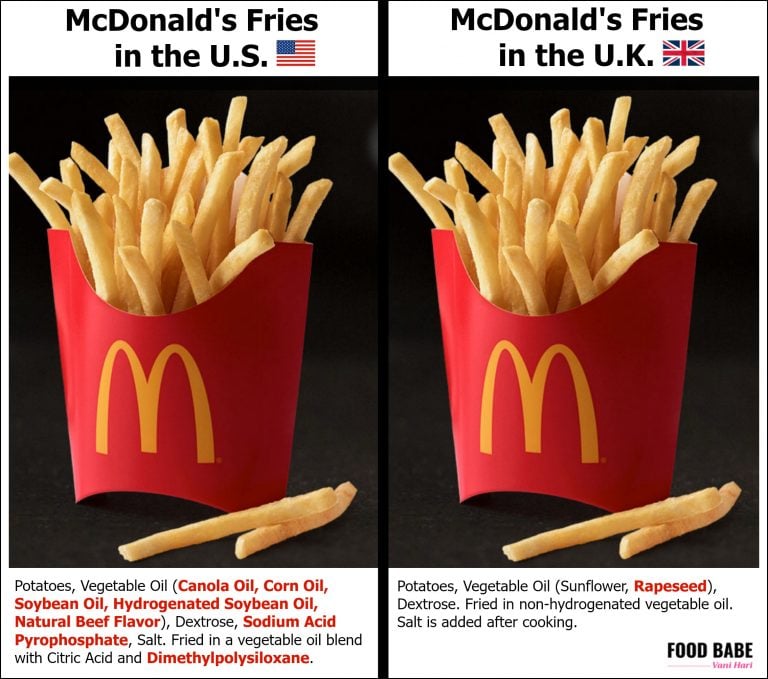
Let’s start with McDonald’s French Fries. They make their iconic french fries in the U.K. with a few simple ingredients: potatoes, oil, dextrose, salt—but in the U.S they’re made with “natural beef flavor” and sodium acid pyrophosphate, and are fried in oil laced with the anti-foaming agent dimethylpolysiloxane – the main ingredient in silly putty (1). They’ve somehow figured out how to cook their fries without all these extra ingredients overseas, so why not here?
2. Quaker Instant Oatmeal Packets
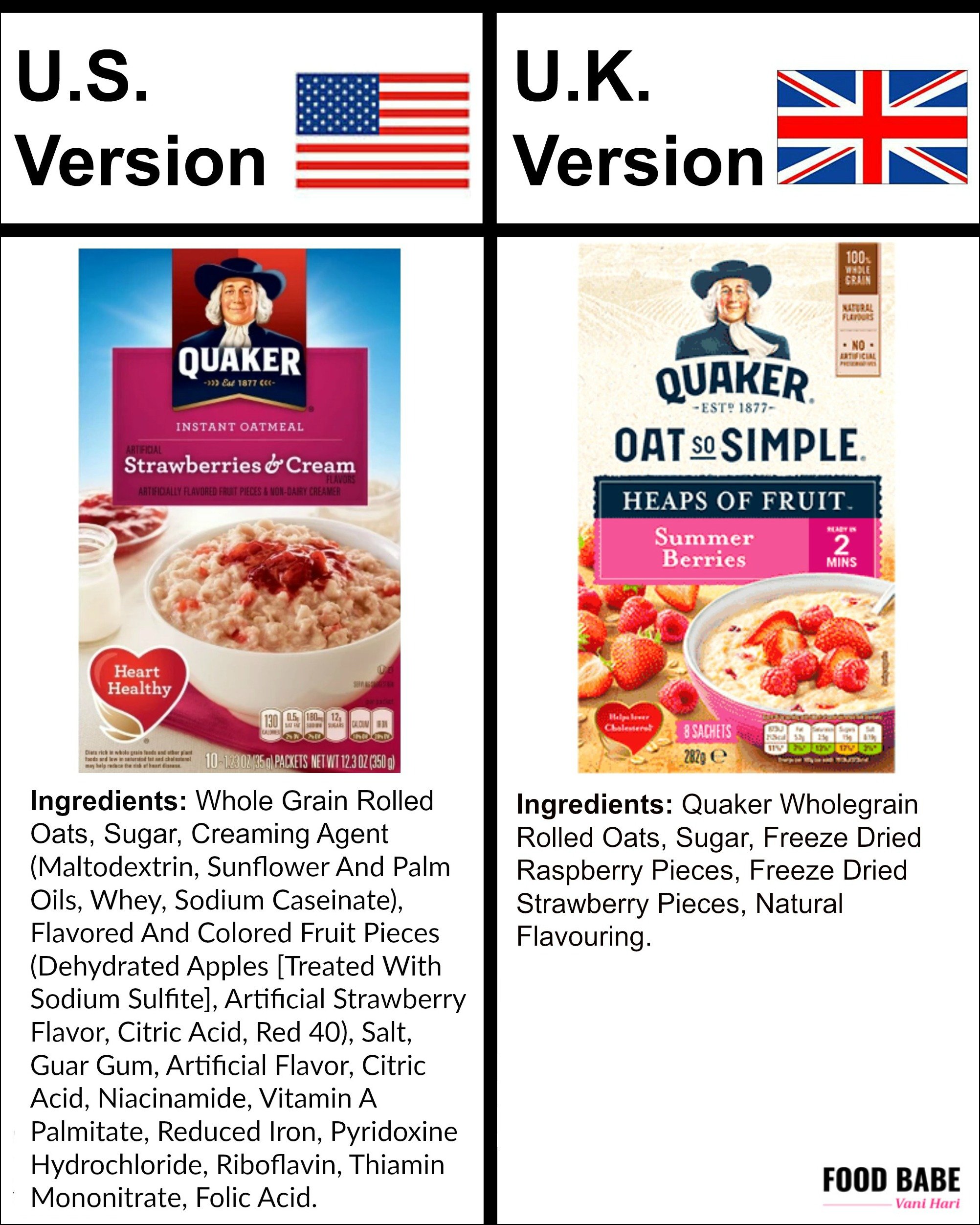
Did you know Quaker Oats Strawberries & Cream has ZERO strawberries? In the U.S. Quaker mimics the look and taste of real strawberries by using “Flavored and Colored Fruit Pieces” comprised of dehydrated apples, artificial strawberry flavor, citric acid, and the artificial dye Red 40. It’s a total scam!
Meanwhile in the U.K. Quaker doesn’t even attempt to sell that garbage and doesn’t make any products like this. The closest counterpart they have is a product called “Oat So Simple” that has REAL strawberries in it—light years ahead of the popular U.S. version made with artificial dyes and artificial flavors.
3. Mountain Dew
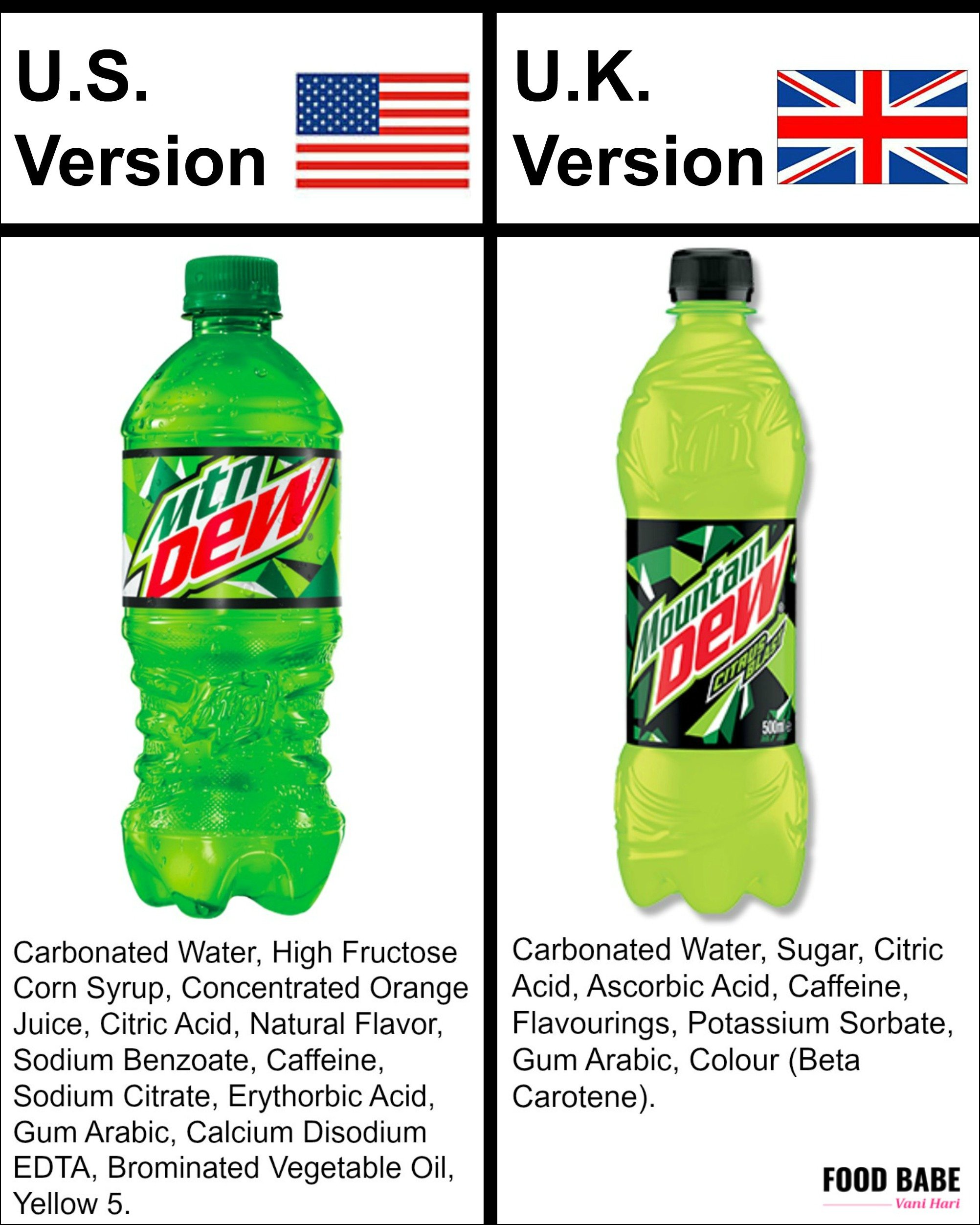
Pick up a bottle of Mountain Dew in the U.K. and you’ll find that it gets its bright yellow color simply from beta carotene (a natural color derived from carrots and other plants). Meanwhile, PepsiCo sells a very different version of Mountain Dew in America. Here in the States, instead of using natural colors to give it a tantalizing look, Mountain Dew is artificially colored with a petroleum-based dye called Yellow #5. Although artificial dyes are common in America, that doesn’t make them okay to eat. They’ve been linked to several health issues and may be contaminated with carcinogens (2). They certainly are not as safe as beta carotene. And it gets worse…
The U.S. version of Mountain Dew contains brominated vegetable oil (BVO) – which is an ingredient BANNED in Europe (3). Way back in 2014, PepsiCo announced they would remove BVO from all of their American drinks following a successful petition by activist Sarah Kavanagh (4). But they still have not removed BVO from Mountain Dew, nearly 5 years later. Meanwhile, they continue to sell BVO-free Mountain Dew in other countries.
4. Heinz Ketchup
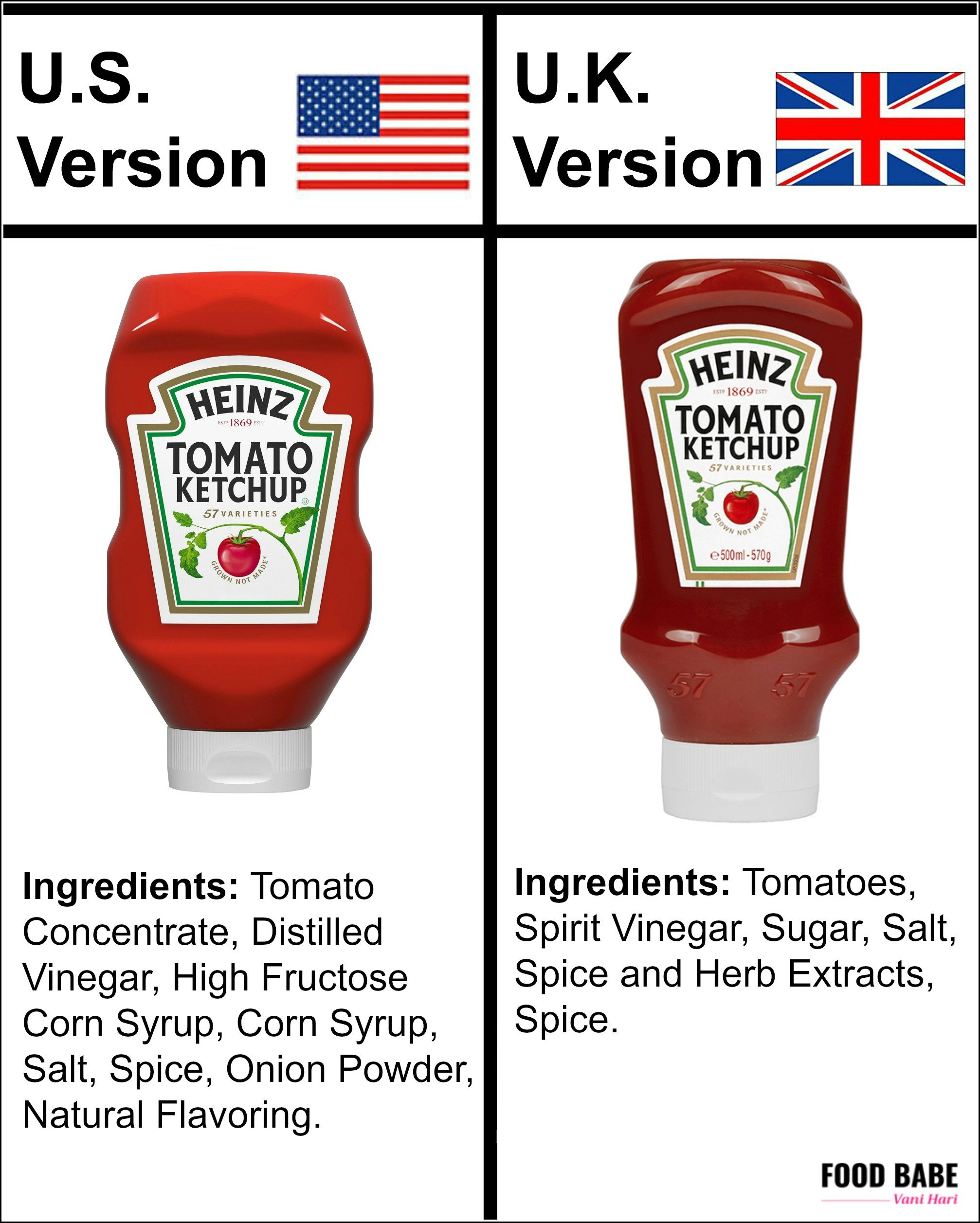 You know what you’ll find in almost every restaurant in America? Heinz Tomato Ketchup. Heinz ketchup is GMO-free in the U.K. (5) but full of GMOs and High Fructose Corn Syrup in the U.S., along with lab-produced “natural flavoring” that helps create an addiction to their product (6). Think of this next time you’re dipping your fries in and can’t stop! While Heinz makes a “Simply Heinz” version of ketchup in the U.S. (still with natural flavors but a cleaner ingredient list), why don’t they just make this their regular ketchup? There is no need for the heavily processed version that you’ll find in most restaurants and homes in America.
You know what you’ll find in almost every restaurant in America? Heinz Tomato Ketchup. Heinz ketchup is GMO-free in the U.K. (5) but full of GMOs and High Fructose Corn Syrup in the U.S., along with lab-produced “natural flavoring” that helps create an addiction to their product (6). Think of this next time you’re dipping your fries in and can’t stop! While Heinz makes a “Simply Heinz” version of ketchup in the U.S. (still with natural flavors but a cleaner ingredient list), why don’t they just make this their regular ketchup? There is no need for the heavily processed version that you’ll find in most restaurants and homes in America.
5. Doritos
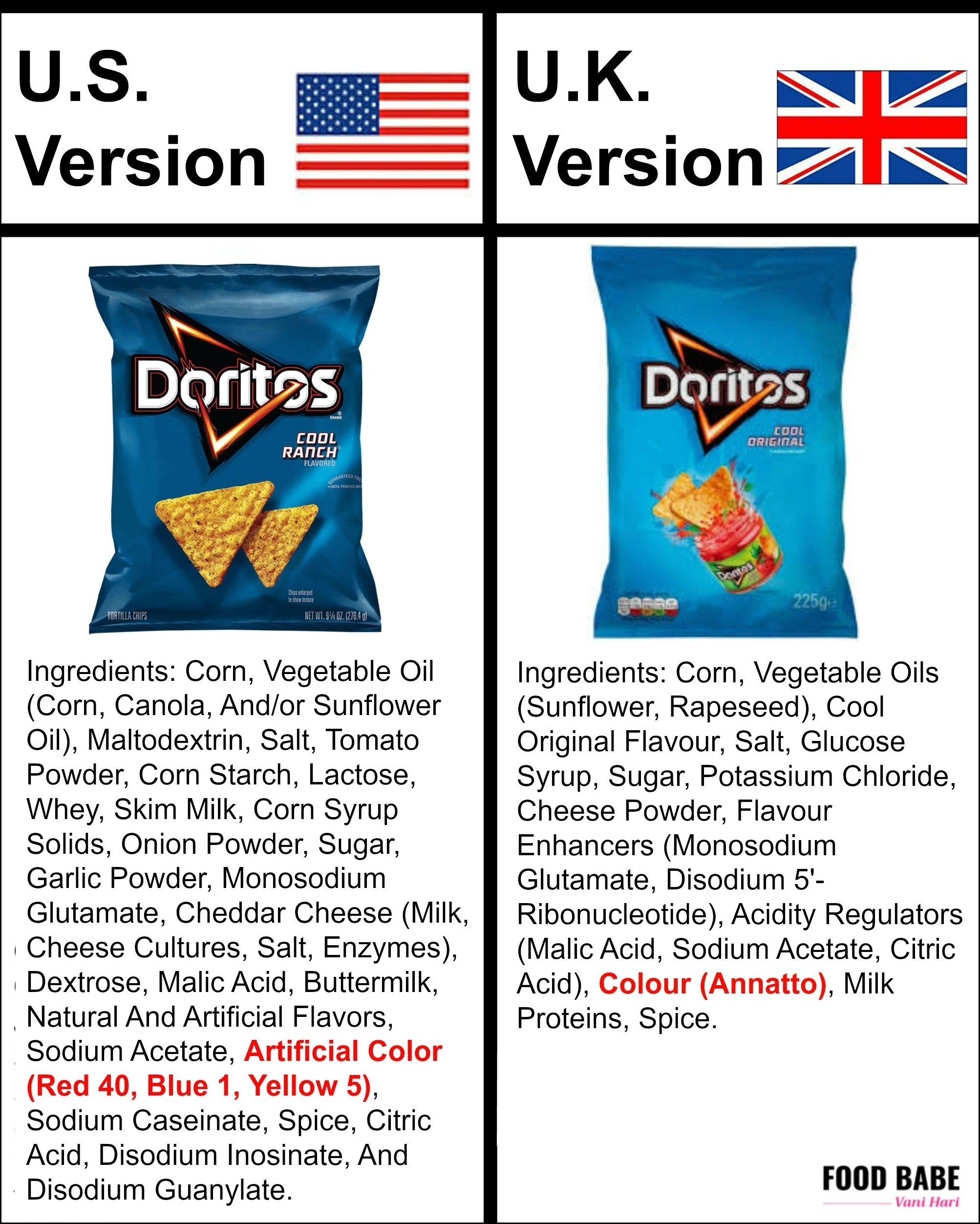
Both versions of Doritos are horrible, but American Doritos are covered in artificial dyes made from petroleum (Red #40, Blue #1, and Yellow #5). These dyes have been found to be contaminated with carcinogens, such as benzidine (2) In the U.K., these dyes require a warning label that says “May Have an Adverse Effect on Activity and Attention in Children” (7). No one wants to put that on their product! That’s why they don’t use artificial dyes in Doritos overseas and instead color Doritos more simply with paprika extract and annatto. The Doritos in the U.K. are also non-GMO, while the American versions are made with GMO corn contaminated with glyphosate weed killer (8).
6. Kellogg’s Frosted Flakes Cereal
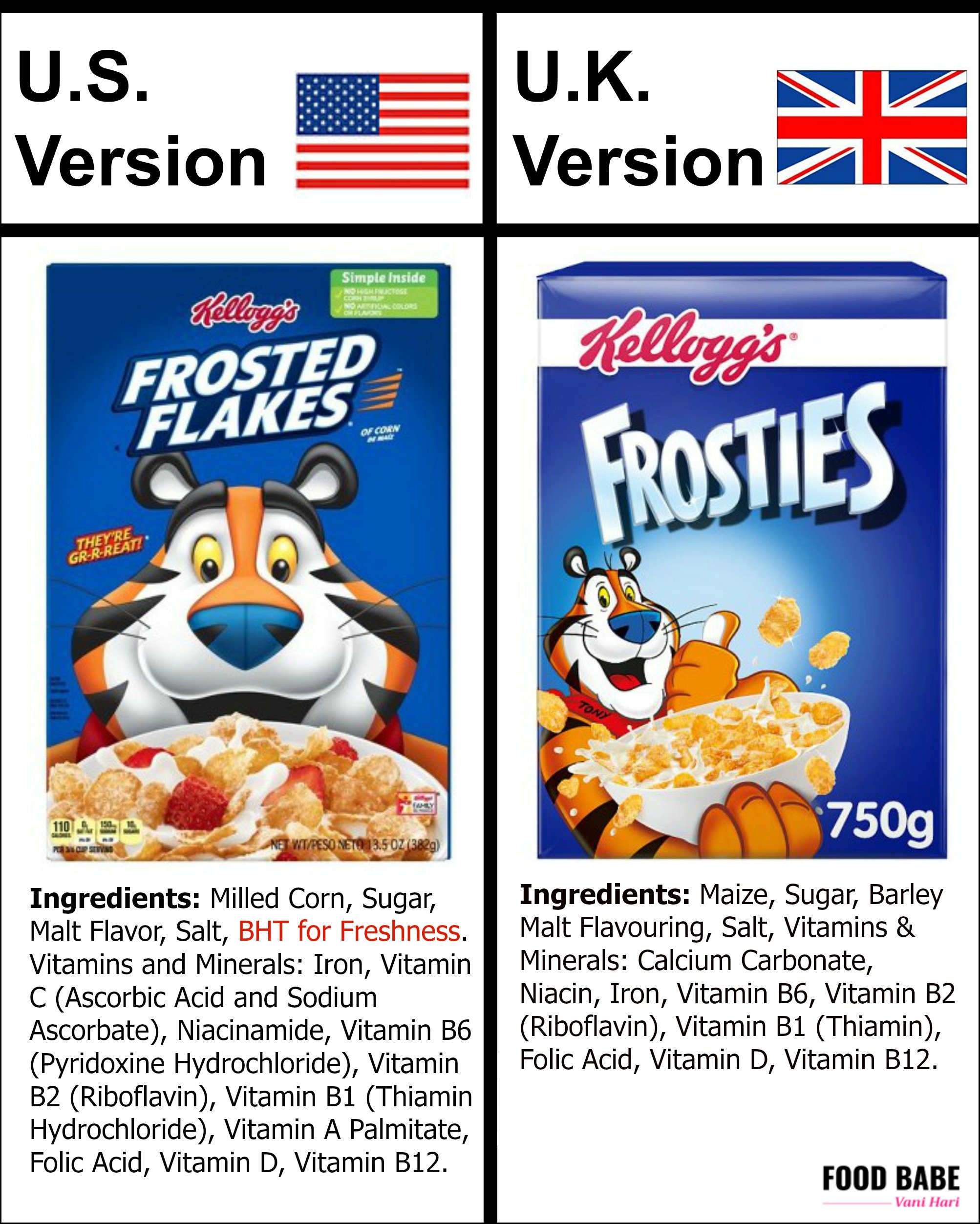
At first glance the ingredients in Frosted Flakes in the U.S. and U.K. look nearly identical. The main difference is the addition of the preservative BHT (butylated hydroxytoluene) in the U.S. version. Controversial research links BHT to cancer (9) and it’s believed to be an endocrine disruptor that interferes with your hormones (10) BHT isn’t permitted in cereals in Europe, so Kellogg’s reformulated their cereals to sell them legally overseas. Following our 2015 petition to get BHT out of American cereal (11) Kellogg’s removed BHT from several brands (like Rice Krispies), but still use it 4 years later in Frosted Flakes despite selling it BHT-free in the U.K.
Why don’t these companies just sell the same, safer, products everywhere?
I’ll tell you why. Europe takes a “precautionary principle” approach towards food additives that are potentially risky. They ban or add warning labels to these additives for their citizens. The U.S. takes the opposite approach. It does not remove additives from our food supply until they have been proven dangerous – which can take a very long time and a lot of red tape. This means Americans are literally the lab rats.
The U.S. government allows food companies to largely police itself, deciding which ingredients, chemicals, and additives are “safe” to use in their products (12). This clearly isn’t a wise approach – is it?
If a company can get away with using cheaper ingredients, they will. Given a choice, they’ll always opt for the cheaper flavor enhancer, and the cheaper color additive, and the cheaper preservative, and the cheaper GMO ingredient, even if these cheaper alternatives have a negative impact on our health.
The truth is that nobody is watching out for us. When they tell you they know their processed foods are safe, they are telling you a lie.
I dedicated an entire chapter in my latest book, Feeding You Lies, to this subject because there is so much more you need to know! The food industry doesn’t care about your health, so you really need to. It is now available in bookstores everywhere.
ORDER NOWFeeding You Lies
Available in stores everywhere
If most Americans knew food companies are selling similar products overseas with healthier ingredients, they’d be outraged. I know I am.
Please share this post with all of your friends. Everyone should know how food companies are scamming Americans with inferior products. This will also inspire these companies to do better and sell safer products in the U.S. Don’t believe me? Look what happened to Kraft Mac & Cheese!
Xo,
Vani

Posts may contain affiliate, sponsorship and/or partnership links for products Food Babe has approved and researched herself. If you purchase a product through an affiliate, sponsorship or partnership link, your cost will be the same (or at a discount if a special code is offered) and Food Babe will benefit from the purchase. Your support is crucial because it helps fund this blog and helps us continue to spread the word. Thank you.
from Food Babe https://ift.tt/2TmGrpg
Comments
Post a Comment